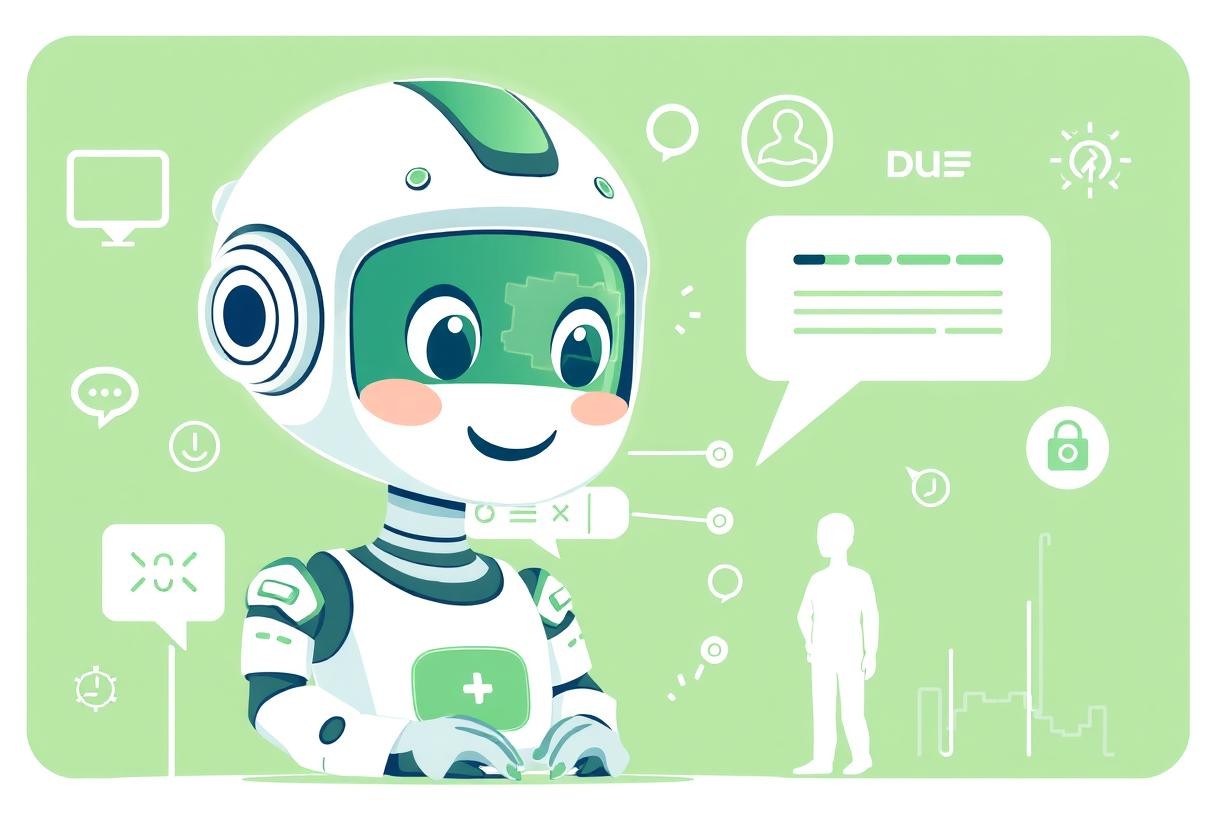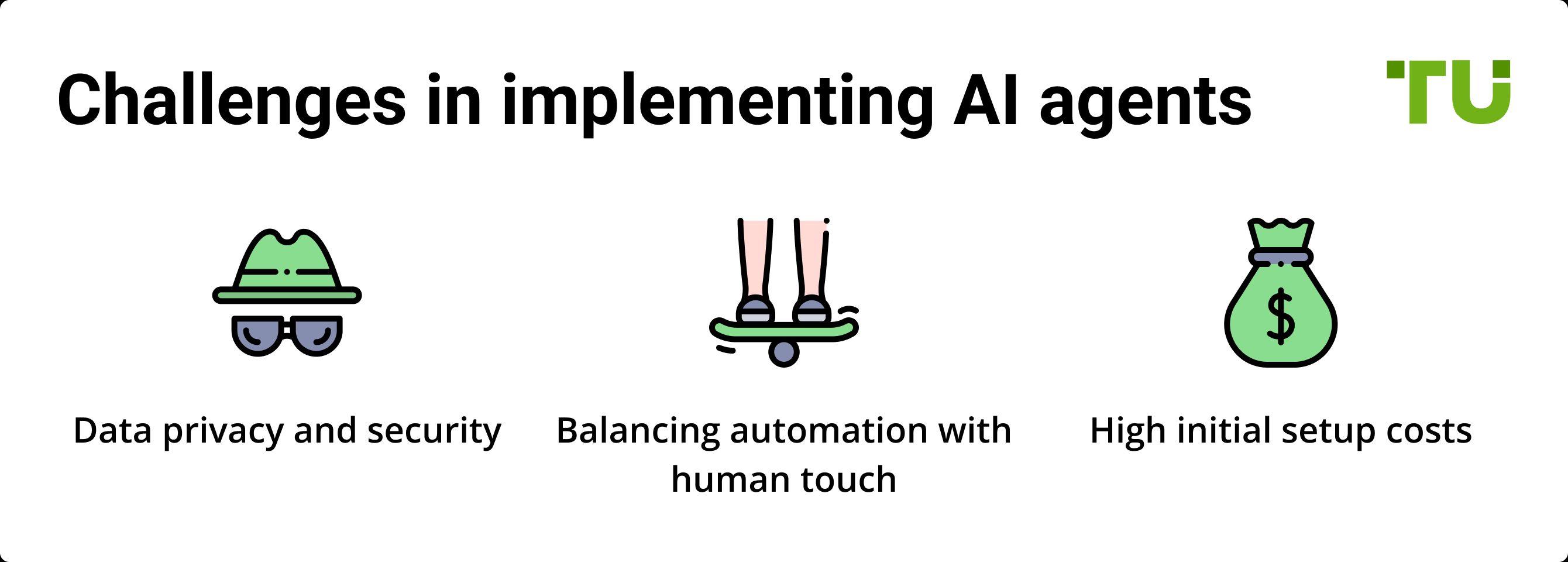AI Agents In Customer Support: The Next Revolution



Editorial Note: While we adhere to strict Editorial Integrity, this post may contain references to products from our partners. Here's an explanation for How We Make Money. None of the data and information on this webpage constitutes investment advice according to our Disclaimer.
AI agents are transforming customer support. Key features:
Instant query resolution. AI chatbots handle FAQs swiftly.
24/7 customer assistance. No downtime or delays.
Personalized interactions. Tailored responses using data.
Scalable support. Handles multiple queries at once.
Cost efficiency. Reduces support team expenses.
Imagine having a team of tireless customer support representatives who never need sleep, can handle endless inquiries at lightning speed, and continuously refine their responses with every interaction. Sounds futuristic, right? Well, that future is here today. Digital assistants in customer support are not just a trend — they’re changing the game. These smart support tools are transforming the way businesses interact with their customers, ushering in a new era of efficiency and personalization.
In this article, we’re diving into the heart of modern customer service. We’ll explore how these assistants work, the advanced tools behind them, the myriad benefits they bring to businesses and customers alike, and what’s next for this fast-changing industry.
Understanding AI agents in customer support

Most people think of AI agents as reactive tools that answer questions, but cutting-edge systems now proactively identify issues before customers even realize them. Some AI-driven support tools scan a user’s behavioral data, flag unusual patterns, and send personalized solutions before a complaint is even filed. Imagine getting a troubleshooting guide for a potential software glitch before you even notice the problem — this is the next level of customer support.
AI agents are now trained to detect customer frustration, not just through text sentiment analysis but by analyzing speech tones, typing speed, and even hesitation in messages. If a customer’s typing speed suddenly increases or their message contains more abrupt sentences, the system adapts in real time — offering empathetic phrasing, escalating to a human agent faster, or even switching from chat to voice assistance for a smoother resolution.
In fact, forget generic support scripts. Advanced AI agents now track micro-behaviors — like how long a user hovers over a product page, the exact wording they use in past inquiries, or their historical complaint patterns — to craft hyper-personalized responses. Instead of getting a one-size-fits-all answer, a customer might receive an AI-generated response referencing their last purchase, past issues, and even their preferred tone of interaction.
While most AI support tools still require human intervention at some point, the latest generation of AI agents is moving toward fully autonomous decision-making. These systems can approve refunds, modify subscription plans, or initiate troubleshooting protocols without requiring managerial approval. They operate within pre-set guidelines but learn over time when to override traditional workflows for maximum customer satisfaction.
Benefits of implementing AI customer support agents

AI customer support agents are transforming how businesses operate. Their ability to handle large volumes of queries with speed and precision offers numerous benefits. Here are the key advantages:
1. Increased efficiency and productivity
Smart virtual assistants manage several requests at once, helping customers faster and allowing businesses to grow their service reach without extra staff.
2. 24/7 availability
Unlike human teams, virtual assistants are available anytime, ensuring customers get help whenever they need it, no matter their location or time zone.
3. Personalization at scale
These assistants learn from past interactions to provide thoughtful recommendations, making support more engaging and improving customer loyalty.
Key features of AI chatbots for customer service
Predictive issue resolution. Instead of waiting for customers to complain, train chatbots to detect patterns in customer behavior, like repeated failed logins or abandoned carts, and step in with help before the issue escalates.
Emotional intelligence simulation. AI chatbots can be trained to recognize frustration, hesitation, or confusion in a customer’s language and tone, then adjust responses dynamically — offering reassurance, escalating to a human, or changing their approach.
Hyper-personalized upselling. Instead of generic recommendations, chatbots can analyze past purchases, browsing habits, and even hesitation during checkout to suggest complementary products in a way that feels natural, not salesy.
Context-aware conversation memory. Advanced chatbots can remember past interactions across multiple sessions, so customers don’t have to repeat themselves. This makes follow-ups smoother and helps build a more personalized experience over time.
Adaptive response timing. Instead of firing off instant replies, chatbots can be programmed to respond at human-like speeds, making conversations feel more natural and reducing frustration for customers who expect a slight delay in real conversations.
AI agents for help desks: Streamlining IT support
AI agents are changing how help desks operate, especially in IT support. By automating common tasks, these agents free up human resources for more critical issues. Here’s how they improve efficiency:
Automated ticket management
Virtual assistants quickly organize and arrange tickets based on urgency, ensuring critical issues get addressed first while others follow smoothly.
Knowledge base access
These assistants connect to the company’s knowledge hub, providing fast and reliable answers to common tech problems. This lowers workload for support teams and ensures customers receive reliable guidance.
Continuous support
Whether it’s a device malfunction or software issue, virtual assistants are always ready to help. They fix simple problems independently, allowing IT teams to focus on more complex cases.
AI in customer experience: Enhancing engagement and satisfaction
AI agents are not just about resolving issues — they also elevate the overall customer experience. Here’s how:
Real-time assistance
Smart assistants provide quick help, allowing customers to solve problems on the spot. Whether it's finding a product, troubleshooting an issue, or tracking an order, they ensure customers don’t have to wait.
Personalized interactions
By understanding customer needs, smart assistants personalize their responses. They remember past interactions, preferences, and purchasing history to offer thoughtful suggestions, making each interaction feel more relevant and engaging.
Feedback collection and analysis
Smart assistants also collect valuable customer input after interactions. This helps businesses identify areas for improvement, ensuring continuous enhancement of the customer experience.
Challenges and considerations in implementing AI agents

While AI agents offer numerous benefits, businesses must carefully consider several challenges when integrating them into customer support systems.
1. Data privacy and security
Smart systems manage private details, making security a priority. Businesses must follow legal privacy rules, like GDPR, to prevent breaches and build trust.
2. Balancing automation with human touch
Smart systems assist with routine work, but some situations require human understanding. A mix of digital assistance and human interaction ensures quality service.
3. High initial setup costs
While smart systems save money over time, upgrading business tools and merging with existing systems can be costly, making it challenging for smaller businesses.
Future trends in AI-powered customer support
AI is revolutionizing customer support in ways that go beyond chatbots — here’s where things are headed and how you can stay ahead.
AI will predict customer frustrations before they arise. Future AI systems will analyze customer behavior patterns and detect signs of potential dissatisfaction, allowing businesses to resolve issues before they escalate.
Personalized responses will feel indistinguishable from human support. AI-driven interactions will mimic human empathy, tone, and intent so well that customers won’t realize they’re talking to a system.
Support agents will have AI copilots that analyze customer mood in real-time. AI tools will listen to tone, pace, and word choice in live conversations, feeding agents suggestions to adjust their responses for maximum impact.
AI will auto-generate custom solutions based on previous interactions. Instead of generic responses, future AI will provide tailored solutions based on past issues, purchase history, and customer preferences.
AI will act as a personal concierge, not just a problem solver. Instead of reacting to issues, AI will proactively offer advice, product recommendations, and troubleshooting before customers even ask.
Smart virtual assistants can now detect frustration and create personalized customer experiences
Most businesses think of virtual assistants as tools for answering common questions, but their true potential lies in picking up on customer emotions. Future customer support will include smart assistants that notice frustration based on typing speed, tone, and word choices. Instead of waiting for customers to get annoyed, these assistants will adjust messages naturally, shift the way they speak, and even pass tricky cases to real people when needed.
This built-in understanding of emotions will make customers feel truly heard, creating a new level of trust in digital support. For beginners, the key is to train assistants to spot frustration early rather than just helping with routine questions.
Another untapped opportunity is using smart assistants to create custom-tailored customer experiences, not just one-off responses. Imagine a system that remembers every past interaction, understands customer habits, and adapts to their preferences automatically.
If a user prefers email over chat, the assistant should know that. If they often ask about troubleshooting, it should suggest solutions before they even reach out. Instead of being something customers turn to when stuck, digital assistants should work like a concierge that’s always one step ahead — figuring out what customers need before they ask.
Conclusion
AI agents are no longer a novelty; they’re a necessity for businesses aiming to provide exceptional customer support. From 24/7 availability to personalized interactions, AI-powered solutions enhance efficiency, reduce costs, and improve customer satisfaction. However, businesses must approach implementation carefully, addressing concerns like data security and the need for human oversight.
By integrating AI into customer support, businesses are not just improving efficiency — they’re shaping the future of customer experience. The future is now, and it’s intelligent, responsive, and ready to meet customer needs at any time.
FAQs
How do AI chatbots improve customer service?
AI chatbots handle routine queries instantly, offer 24/7 support, and integrate seamlessly with existing platforms. Over time, they learn from customer interactions, improving response accuracy.
Are AI agents more efficient than human agents?
AI agents can handle multiple queries at once, providing faster responses and freeing human agents to focus on more complex issues. This boosts overall efficiency.
What are the challenges of using AI in customer support?
Some challenges include data privacy concerns, balancing automation with human empathy, and the high initial setup cost. However, these can be managed with careful planning.
Will AI ever replace human agents?
While AI agents are becoming more advanced, they are unlikely to fully replace human agents. AI excels in handling routine tasks, but human agents are still needed for complex or emotional situations.
Related Articles
Team that worked on the article
Peter Emmanuel Chijioke is a professional personal finance, Forex, crypto, blockchain, NFT, and Web3 writer and a contributor to the Traders Union website. As a computer science graduate with a robust background in programming, machine learning, and blockchain technology, he possesses a comprehensive understanding of software, technologies, cryptocurrency, and Forex trading.
Having skills in blockchain technology and over 7 years of experience in crafting technical articles on trading, software, and personal finance, he brings a unique blend of theoretical knowledge and practical expertise to the table. His skill set encompasses a diverse range of personal finance technologies and industries, making him a valuable asset to any team or project focused on innovative solutions, personal finance, and investing technologies.
Chinmay Soni is a financial analyst with more than 5 years of experience in working with stocks, Forex, derivatives, and other assets. As a founder of a boutique research firm and an active researcher, he covers various industries and fields, providing insights backed by statistical data. He is also an educator in the field of finance and technology.
As an author for Traders Union, he contributes his deep analytical insights on various topics, taking into account various aspects.
Mirjan Hipolito is a journalist and news editor at Traders Union. She is an expert crypto writer with five years of experience in the financial markets. Her specialties are daily market news, price predictions, and Initial Coin Offerings (ICO).
Xetra is a German Stock Exchange trading system that the Frankfurt Stock Exchange operates. Deutsche Börse is the parent company of the Frankfurt Stock Exchange.
Cryptocurrency is a type of digital or virtual currency that relies on cryptography for security. Unlike traditional currencies issued by governments (fiat currencies), cryptocurrencies operate on decentralized networks, typically based on blockchain technology.
Forex trading, short for foreign exchange trading, is the practice of buying and selling currencies in the global foreign exchange market with the aim of profiting from fluctuations in exchange rates. Traders speculate on whether one currency will rise or fall in value relative to another currency and make trading decisions accordingly. However, beware that trading carries risks, and you can lose your whole capital.
Forex leverage is a tool enabling traders to control larger positions with a relatively small amount of capital, amplifying potential profits and losses based on the chosen leverage ratio.






























































































































